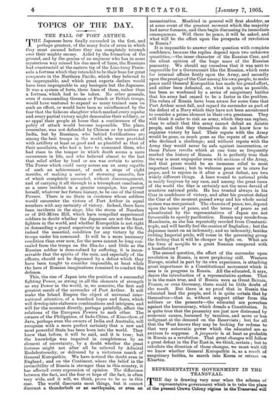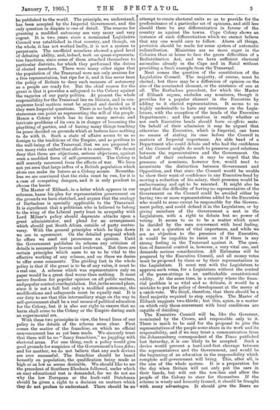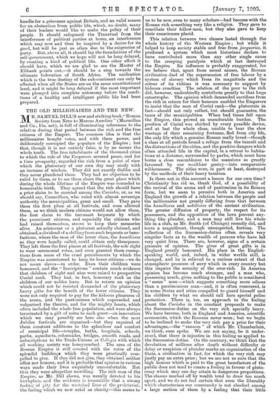HE day is drawing very near when the scheme of
representative government which is to take the place of the present Crown Colony riSgime in the Transvaal will only question in dispute is one of detail. The reasons for granting a modified autonomy are very many and very cogent. It is two years since a nominated Legislative Council was established in that country, and though, on the whole, it has not worked badly, it is not a system to perpetuate. The unofficial members showed a good level of debating ability, and, indeed, took on quasi-representa- tive functions, since some of them attached themselves to particular districts, for which they performed the duties of elected members. There were many other signs that the population of the Transvaal were not only anxious for a free representation, but ripe for it, and it has never been the policy of Britain to deny such measure of autonomy as a people are ready for. But the chief reason for the grant is that it provides a safeguard to the Colony against the vagaries of our party politics. At present the whole responsibility for the Transvaal lies on Britain, and in con- sequence local matters must be argued and decided as if they were Imperial questions. There is no body to which a statesman can point as representing the will of the people. Hence a Colony which has to face many serious and intricate problems of its own is in danger of becoming the plaything of parties, and of having many things touching its peace decided on grounds which at bottom have nothing to do with it. Such a state of affairs seems to us so foreign to the traditions of the Empire, and so perilous to the well-being of the Transvaal, that we are prepared to run many risks rather than allow it to continue. We do not deny that there are objections, serious objections, against even a modified form of self-government. The Colony is still scarcely recovered from the effects of war. We have not yet seen that large influx of a British population which alone can make its future as a Colony secure. Neverthe- less we are convinced that the risks must be run, for it is a case of competing dangers, and it is only prudent to choose the lesser.
The Master of Elibauk, in a letter which appears in our columns, bases his plea for representative government on the grounds we have sketched, and argues that the analogy of Barbadoes is specially applicable to the Transvaal. It is significant that a politician who is believed to belong to the wing of the Liberal party least in sympathy with Lord Milner's policy should deprecate attacks upon a great administrator, and plead for an arrangement which should put South Africa outside of party contro- versy. With the general principles which he lays down we are in agreement. On the detailed proposal which he offers we need not pronounce an opinion. -Until the Government publishes its scheme any criticism of details is necessarily barren and. irrelevant. But there are certain principles which seem to us to be vital to the effective working of any scheme, and on these we desire to offer some comments. The guiding fact in the whole policy is that if the grant is to be of any value, it must be a real one. A scheme which was representative only on paper would be a great deal worse than nothing. It must secure freedom for popular opinion on all public matters, and popular control overlegislation. But, in the second place, since it is not a full but only a modified autonomy, the modifications and safeguards must be equally real. It is our duty to see that this intermediary stage on the way to self-government shall be a real means of political education for the Colony, but it is also our right to ensure that no harm shall come to the Colony or the Empire during such an experimental era. With these two principles in view, the broad lines of our policy in the details of the scheme seem clear. First comes the matter of the franchise, on which no official announcement has as yet been made. We sincerely trust that there will be no "fancy franchises," no juggling with electoral areas. For one thing, such a policy would give good grounds for suspicion of the Government's bona frle,s ; and for another, we do not believe that any such devices are ever successful. The franchise should be based honestly on population, the qualification being made as high or as low as seems desirable. We should like to see the precedent of Southern Rhodesia followed, under which an easy educational test is demanded, for we do not see why the low European or the back-veld Dutchman should be given a right to a decision on matters which they do not profess to understand. There should be no attempt to create electoral units so as to provide for the predominance of a particular set of opinions, and still less should there be any differentiation in favour of the country as against the towns. Cape Colony shows an instance of such differentiation which we cannot believe that any one would care to follow. Above all things, provision should be made for some system of automatic redistribution. Ministries are no more eager in the Colonies than at home to face the grave difficulties of a Redistribution Act, and we have sufficient electoral anomalies already in the Cape and in Natal without providing a fresh example from the Transvaal.
Next comes the question of the constitution of the Legislative Council. The majority, of course, must be elected ; but there may be a difference of opinion on the size of the nominated element, or the existence of one at all. The Barbadoes precedent, for which the Master of Elibank argues, excludes any nominees, though it provides for a popular element in the Executive by adding to it elected representatives. It seems to us highly undesirable to have any nominees on the Legis- lature, with the exception of the heads of the Executive Departments ; and the question is really whether or not such Executive heads should have ex-officio seats. On behalf of their admission it may be argued that otherwise the Executive, which is Imperial, can have no means of stating its case before the Council in matters of Imperial importance. An able head of a Department who could debate and who had the confidence of the Council might do much to preserve good relations between the representatives and the Government. On behalf of their exclusion it may be urged that the presence of nominees, however few, would tend to accentuate the distinction between Government and Opposition, and that since the Council would be unable to show their want of confidence in any Executive head by moving a reduction of his salary, their presence would be embarrassing and apt to be resented. It might also be urged that the difficulty of having no representative of the Government on the Council could be avoided either by having two or more representatives added to the Executive who would to some extent be responsible for the Govern- ment policy, and could defend it in the Legislature, or by giving members of the Government a seat in the Legislature, with a right to debate but no power of voting. It seems to us to be a matter which must be decided by the men conversant with local feeling. It is not a question of vital importance, and while we see no objection to the presence of the Executive, it would be impolitic to insist on it if there is any strong feeling in the Transvaal against it. The ques- tion of financial control is, however, a very vital one, and demands serious consideration. All Estimates will be prepared by the Executive Council, and all money votes must be proposed by them or by their representatives in the Legislature. It must rest with the Legislature to approve such votes, for a Legislature without the control of the purse-strings is an unthinkable constitutional oddity. At the same time, in a country where the finan- cial problem is so vital and so delicate, it would be a mistake to put the policy of development at the mercy of a catch-vote. We think, therefore, that there should be a fixed majority required to stop supplies. The Master of Elibank suggests two-thirds ; but this, again, is a matter on which only those conversant with local conditions are capable of deciding. The Executive Council will be, like the Governor, nominated by the Crown, and responsible only to it. There is much to be said for the proposal to give the representatives of the people some share in its work and its responsibility, and if we may trust a communication from the Johannesburg correspondent of the Times published last Saturday, it is one likely to be accepted. Such a device would prevent a hard-and-fast cleavage between the representatives and the Government, and would be the beginning of an education in the responsibility which complete self-government will bring. This, after all, is the aim of the whole system. It is a preparation for the day when Britain will not only put the oars in their hands, but will cut the tow-line and allow the people of the Colony to steer for themselves. If the scheme is wisely and honestly framed, it should be fraught with many advantages. It should give the Boers no handle for a grievance against Britain, and no valid reason for an abstention from public life, which, no doubt, many of their leaders would like to make the policy of their people. It should safeguard the Transvaal from the interference of political parties at home, an interference which may now and then be inspired by a desire for its good, but will be just as often due to the exigencies of party. But, above all, it should lay the foundations of the self-government, which we hope will not be long delayed, by creating a kind of political life. One other effect it should have, which we are glad to see the Master of Elibank points out,—it should be a step towards the ultimate federation of South Africa. The unification which is the true destiny of the sub-continent can only be effected when all the States are on the same constitutional level, and it might be long delayed if the most important were plunged into complete autonomy before the condi- tions of a healthy and intelligent public life had been prepared.
THE OLD MILLIONAIRES AND THE NEW.
















































 Previous page
Previous page